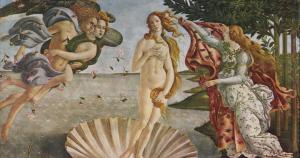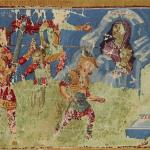Love (true love) and desire should go together, but sometimes do not. That Hideous Strength, the most important novel for this time, begins with a reflection on a failing marriage and ends in a marriage joyfully consummated. CS Lewis fills, mayhap overfills the book with themes, but one is the relationship of the body to the soul.
Picking up on themes in the speeches of Plato’s Timaeus with a heavy use of early and Medieval Christian cosmology, Lewis presents a world of dualities: heart and mind, magic and science, heaven and earth, body and spirit. In most of the cosmos, the dualities harmonize in a third, a spirit that brings them together, but on Earth, due to our separation from God, any two natures are likely to split.
We know disharmony on Earth.
Body and soul do not harmonize as they should. Our broken human spiritual nature, our noetic self, can no longer do the job. The passion that the beauty of both body and soul arouses in us often goes wrong, sometimes tragically wrong. This is portrayed in the shattered marriage of Jane and Mark Studdock where all the dualities are being ripped apart: male and female, work and play, desire and fecundity. The Holy Spirit which should mediate in a marriage is missing.
Jane Studdock is eager to get back to work on her doctoral dissertation with the unpromising thesis: Donne’s Triumphant Vindication of the Body. This is unpromising, because so overdone. (Jane, unlike a male student in the book, is at least not beginning with the sentence: “Donne was born. . .”
The great poet John Donne began writing about desire, mostly centered in bodies, and ended in a Beatific Vision of God. The lazy road is to see the two as inconsistent, the slightly more promising way of reading the great poet finds a basic consistency, and the genuine doctoral thesis would be working out how the earthly erotic fits with the heavenly. That is a very hard task to do in words.
Lewis makes the simple point that Christian marriage is the (or can be) the triumphant vindication of the body, soul, desire, and love. Stating how this works (as Mother Dimble would point out) is hard to those of us raised in an age when genuine marriages are rare, but was easier for those who saw or see the genuine harmony of all the dualities. After all being in love with the beloved is much easier than describing such a state! For that we need a poet like John Donne and even then we are tempted to read the “earthy” and “religious” passion as opposed or in conflict.
Donne’s poetry is not a triumphant vindication of the body, but of the body and soul in harmony. Donne does not vindicate men or women, but passionately unites the two in the only relationship that can produce immortal souls. Donne gives each of the ancient and basic truths, body, soul, male, female, earth, heaven, a hard reality and then insists that both can exist in one life: his own.
That Hideous Strength ends, as all reality will, in a splendid renewal of a marriage. In the book, the saved marriage is that of Jane and Mark, but in the world to come all of us are united to the good God: we are bride to His Son.













